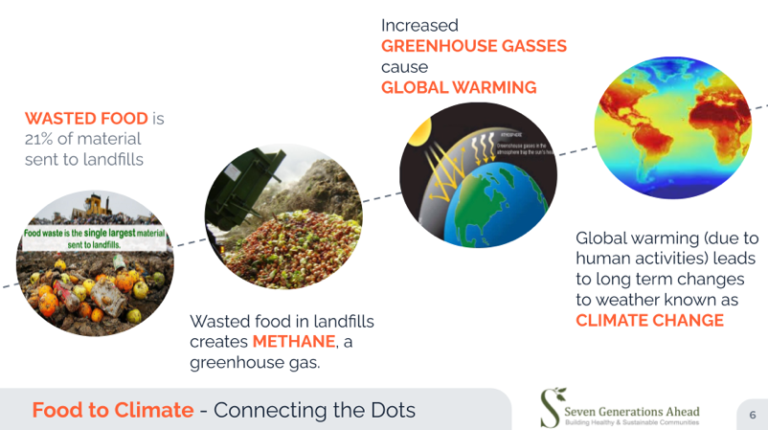
What is the connection between food and the climate crisis?
When we hear concern about the rising surface temperature of the planet, what does this actually mean? What are some of the impacts we are experiencing in the United States? And what does the food in your refrigerator have to do with the climate crisis?
As the surface of our planet warms up, this impacts water, temperature, and weather across the globe. Flooding, heat waves, wildfires, droughts, animal extinction, and more. These impacts are growing in frequency and severity, and if unchecked, the climate crisis may become irreversible.
So what does food waste have to do with all of this? As it turns out, a lot.
- Food waste is the single largest material sent to landfills.
- 40% of all food in the US gets wasted, while 1 out of 7 Americans are food insecure.
- We are not just wasting food that could end global hunger, but we’re burning up the planet’s resources in the process. According to the USDA, In the United States, food production uses 50% of our land, 30% of all energy resources, and swallows 80% of all freshwater (USDA, 2016).
- Food waste produces methane. According to the US EPA, methane is the second most abundant greenhouse gas, after carbon dioxide, and is more than 25 times as effective at trapping heat. So, it’s a huge contributor to climate change. And where does a large percentage of anthropogenic methane come from? Food waste decomposing in landfills.
If we’re serious about tackling climate change, we’ve got to tackle food waste.
SGA’s Work on Food Waste
SGA has worked to build a healthy and sustainable food system since our founding 20 years ago. From our early work bringing local healthy food into school lunchrooms…to teaching students to value and enjoy local produce with our Fresh From the Farm curriculum… to modeling and hosting zero waste events…to our Zero Waste Schools program supporting composting food scraps and recycling in lunchrooms and kitchens…to serving as the state lead for Illinois Farm to School…to helping to found and lead the Illinois Food Scrap Coalition and the Wasted Food Action Alliance. Our work to support a sustainable food system has evolved over time, as have the climate challenges we face and possible solutions.
Individual Actions can Make a Big Difference
We can all make individual changes (swapping to a renewable energy provider, eating less meat and dairy, choosing to cycle or walk instead of drive) or use our voices to influence policy-makers and business owners to make change.
Project Drawdown ranks reducing food waste as the No. 3 action item out of 80 to address climate change – to the tune of more than 70 gigatons of carbon reduction. Other food related solutions include regenerative agriculture (#11), conservation agriculture (#16), farmland restoration (#23), composting (#60), and nutrient management (#65). According to Chad Frishmann, vice president and research director at Project Drawdown, “the decisions we all make every day on the food we produce, purchase and consume is perhaps the single most important contribution an individual can make.”
Americans throw away an estimated 25% of the food we bring home. This is equal to more than 20 pounds of food per person EVERY MONTH! And consumers are the most significant cause of food waste — more than grocery stores, restaurants, or any other segment of the supply chain. The largest segment of food waste comes from households allowing food to go bad. This is one place where it really is true: Your actions do make a difference.
- – IN OUR LIVES: We can eliminate the majority of food waste and then use what is not eliminated to feed the hungry, feed animals, or to create new soil or energy through composting and anaerobic digestion. As individuals and communities, making small changes in the way we manage our behavior related to food can have a large impact, for ourselves and the environment.
- – IN OUR COMMUNITIES: Develop a set of ideas or recommendations and identify the appropriate person/s to meet with in your community. Identify potential allies such as like-minded local environmental or hunger relief organizations.
- – IN OUR STATE AND NATION: Whether it’s joining the composting program in the community, or supporting a state-wide ban against food waste, state and local governments have the means to enact programs that can reduce wasted food on a larger scale.
SGA Recommended New Year’s Resolutions
PREVENT
- – Shop smarter, prep and store food, and use tools available through the US EPA Food:Too Good to Waste program
- – Bring your own container to bring home leftovers when you eat out
- – Buy the imperfect looking produce at the grocery store so it does not get thrown away
RESCUE
- – Support getting food to people who need it – donate food, volunteer or support a local food rescue group https://wastedfoodaction.org/food-banks/
RECYCLE
- – Compost your food scraps
- – Compost fruits and veggies in your backyard https://illinoiscomposts.org/composting-at-home/
- – Find out if your community collects food scraps for compost and start using the program Illinois Composting Municipalities by County or work to get your community to offer one Residential Food Scrap Composting: A Guide for Illinois Municipalities
- – Support businesses that are composting (see We Compost recognition program for a business near you) https://illinoiscomposts.org/we-compost/
